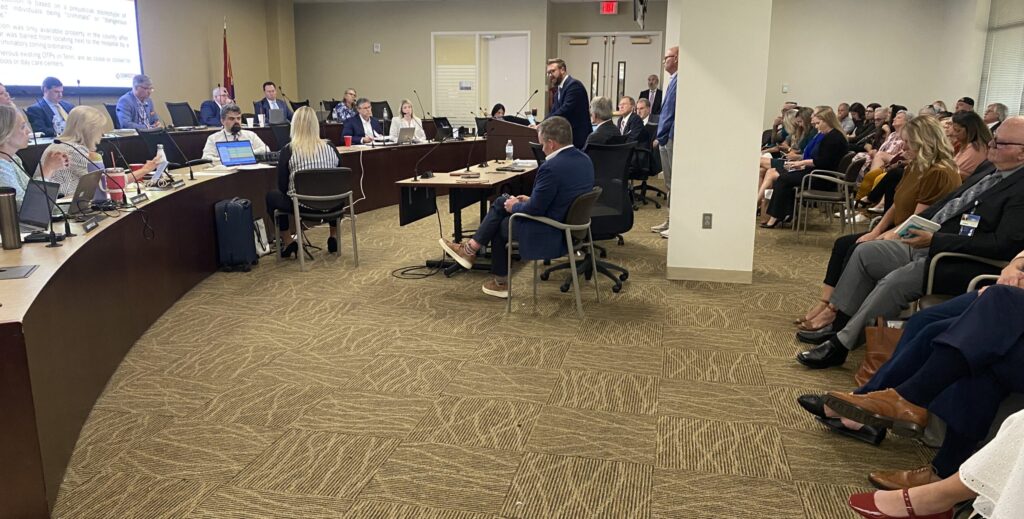
Putnam County residents have been rallying against a proposed methadone clinic in their community. They attempted to convince state regulators to block it, saying those kinds of opioid treatment facilities would bring in gangs and violent crime, and it would put nearby schoolchildren in danger.
Ultimately, the opponents were unsuccessful.
State health officials green lit Cedar Recovery’s $2.5 million project last week. Several other agencies will have to sign off on the clinic before it can start operating, including the U.S. Drug Enforcement Agency, according to the company’s chief strategy officer, Paul Trivette. The company will build out the facility, then begin applying for all of that licensing.
The standard treatment
If approved, the clinic will sit outside of Cookeville, about 80 miles west of Nashville. It’s designed to serve opioid use disorder patients who live in a dozen counties in the Upper Cumberland area. The company’s proposal estimated there are more than 6,500 Tennesseans in the area who suffer from opioid use disorder. It also found that their average distance from the nearest methadone clinic is more than 100 miles.
Methadone is used in medication-assisted treatment. Here’s the idea: When patients with opioid addiction suddenly quit, they can go into painful withdrawal. They experience overwhelming cravings. Methadone prevents withdrawal and cuts the cravings without providing the feelings of euphoria that other opioids do. It manages symptoms while patients undergo counseling and get treatment for their underlying mental health issues.
Outpatient medication-assisted treatment is a standard treatment for severe opioid use disorder. About 2,000 clinics across the U.S. use the medication. There are already dozens of treatment centers offering methadone in Tennessee. Public health research has found there is no evidence showing methadone clinics cause crime increases.
But methadone treatment centers remain highly controversial. Putnam County is no exception.
The passionate response
First, residents from the area wrote hundreds of letters opposing Cedar Recovery’s proposed clinic. Then, they spent hours testifying against it.
“Not only do we not need the Cedar Recovery methadone clinic in Putnam County, it’s a travesty that they planned to put such a clinic in the same building that houses a sports training facility for minors and children — a daycare center around the corner,” said one opponent, Patrick Scott.
One man held up a picture of his granddaughter, saying she goes to the new elementary school nearby, and there would be blood on Cedar Recovery’s hands if anything ever happened to her.
Will Roberts, the executive director of Cookeville Rescue Mission, was one of several residents who shared his own recovery story to explain his opposition to the clinic and medication assisted treatment generally. He was addicted to methadone in the 1980s. He said he personally got sober through Alcoholics Anonymous and Narcotics Anonymous, and that the community has several other support groups and 12-step programs.
“There are other ways of doing this,” he said. “This MAT thing, it’s never worked. It never will work. And the reason it doesn’t work because you can’t get off a drug by doing drugs. It just gives you another addiction.”
Multiple residents made similar comments about medication-assisted treatment, saying that faith-based programming is a better alternative.
The deciding body
But these residents were testifying to the Health Facilities Commission. That group determines whether to grant a certificate of need. In Tennessee, health providers have to convince this board their services are in demand, and that they’re able to offer those services safely and adequately.
Before and after the hours of testimony, the board’s attorney, Jim Christoffersen, warned members against considering the land-use and public safety concerns when deciding how to vote. He offered two reasons: The board doesn’t oversee zoning, and federal law protects substance use treatment centers from discrimination.
“Would you decide not to put an MRI unit there, if somebody was coming in wanting to put an outpatient diagnostic center there?” he said. “You can’t treat this any differently than you would treat the other type of applicant. Otherwise, we would end up in violation of the Americans with Disabilities Act.”
Trivette said Cedar Recovery identified a need for methadone services in the Upper Cumberland area in 2022.
“It was a long process,” he said. “We honestly did not realize it was going to be this long, but we kept hitting a lot of roadblocks.”
The company tried to propose the project in the city limits of Cookeville, but strong opposition and zoning restrictions made that goal unattainable. It also tried to pitch the project in Overton County, but critics there were even more vocal. One supporter found his headlights busted out after a community hearing.

